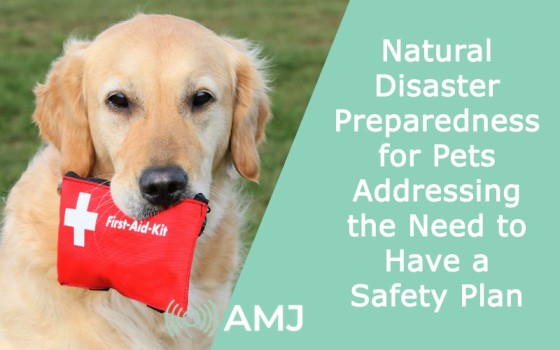Contents
- 1 Introduction
- 1.1 The Inherent Risks Pets Face in Disasters
- 1.2 Threats from Natural Elements
- 1.3 Panic and Separation
- 1.4 Injury and Illness
- 1.5 Crafting the Perfect Safety Plan for Pets
- 1.6 Pet Identification
- 1.7 Emergency Kit
- 1.8 Evacuation Plans
- 1.9 Insurance: Your Aftermath Ally
- 1.10 Covering Medical Expenses
- 1.11 Temporary Housing Assistance
- 1.12 Peace of Mind
- 1.13 The Tangible Benefits of Pet Insurance
- 1.14 Offset High Medical Costs
- 1.15 Quick and Efficient Claims
- 1.16 Expansive Network
- 1.17 The Relevance of Dog Insurance
- 2 Frequently Asked Questions
- 3 Conclusion
Introduction
When the earth rumbles or the skies open, it’s not just us humans who are affected. Our beloved pets, an integral part of our families, are equally at risk. While we often have plans for ourselves, how often do we think of “Fido” or “Whiskers”? Addressing this often overlooked topic, this guide delves into the necessity of having a safety plan for our pets during natural disasters. Furthermore, it sheds light on how pet insurance can be a boon in the chaotic aftermath.
The Inherent Risks Pets Face in Disasters
Natural disasters can be the stuff of nightmares, especially if you’re caught off-guard. For our pets, who rely heavily on us, these events can be even more traumatic.
Threats from Natural Elements
From flooding to forest fires, each natural disaster brings its unique set of challenges. Pets, with their limited understanding, can easily be trapped, injured, or worse. Whether it’s the risk of drowning in floods or suffering burns from wildfires, the perils are real.
Panic and Separation
In the face of looming danger, pets can act unpredictably. The roaring sound of a tornado or the shaking ground during an earthquake can send them into a panic. This heightened stress can lead to them fleeing, becoming lost, or getting separated from their families.
Injury and Illness
Post disaster, with structures toppled and debris scattered, the risk of physical injuries to pets significantly increases. Additionally, the lack of clean water and food can expose them to diseases.
Crafting the Perfect Safety Plan for Pets
Recognizing the dangers is the first step. The next? Preparing for them.
Pet Identification
Ensure your pet has a collar with an updated ID tag. Consider microchipping them. This tiny chip, embedded under their skin, can greatly enhance the chances of a reunion if you’re separated.
Emergency Kit
Just as you’d have an emergency bag for your family, prepare one for your pets. This should include:
- Basic first-aid supplies
- A three-day supply of pet food and clean water
- Medications and medical records
- Leashes, harnesses, or carriers
- Recent photos of your pet for identification
Evacuation Plans
Know where you can go. Research pet-friendly shelters or hotels in advance. Remember, many evacuation centers might not accept pets, so it’s crucial to have a backup plan.
Insurance: Your Aftermath Ally
The storm has passed, but challenges might just be beginning. This is where insurance, especially dog insurance, can play a pivotal role.
Covering Medical Expenses
Natural disasters can result in injuries. From minor cuts to severe wounds, the medical bills can pile up. Insurance can cover a significant portion of these unforeseen expenses.
Temporary Housing Assistance
Some insurance policies provide coverage for boarding facilities if your home is uninhabitable after a disaster. This can offer a temporary respite for your pet in a safe and caring environment.
Peace of Mind
Knowing that a significant portion of potential expenses can be covered can provide invaluable peace of mind in an otherwise stressful situation.
The Tangible Benefits of Pet Insurance
For many, pet insurance might seem like an unnecessary expense. But when faced with the unpredictability of natural disasters, it can prove its weight in gold.
Offset High Medical Costs
Treatments, especially for injuries, can be expensive. Insurance can cushion the blow by covering a considerable chunk of these costs.
Quick and Efficient Claims
Reputable insurance providers often have a streamlined claims process, ensuring you get the necessary funds in a timely manner.
Expansive Network
Many insurance providers have a vast network of veterinarians and clinics, ensuring quality care for your furry friend.
The Relevance of Dog Insurance
With dogs being one of the most popular pets globally, specialized insurance for them is more relevant than ever. It’s tailored to address canine-specific needs, from breed-specific ailments to injuries they might sustain during disasters.
Frequently Asked Questions
Why is it essential to have a safety plan for pets during natural disasters? A safety plan ensures that pets have the best chance of survival and minimal distress during such catastrophic events.
How can insurance aid after a natural disaster? Insurance can cover medical treatments, temporary housing, and other unforeseen expenses that arise in the aftermath of a disaster.
Is dog insurance different from regular pet insurance? Yes, dog insurance is tailored specifically for dogs, considering their unique needs and potential breed-specific ailments.
Can microchipping increase the chances of reuniting with a lost pet? Absolutely. Microchips provide a reliable form of identification, making reunions more likely if pets get lost during a disaster.
Do all pet insurance policies cover disaster-related injuries? Not necessarily. It’s crucial to read the terms and ensure that such coverage is included before finalizing a policy.
Is temporary housing for pets common in insurance policies? Some comprehensive policies offer this benefit, but it’s essential to check with the insurance provider.
Conclusion
Natural disasters are an unfortunate reality of our world. While we can’t prevent them, we can certainly prepare. For our beloved pets, who rely on us for their well-being, creating a safety plan is not just essential – it’s a duty. Couple that with the protective umbrella of insurance, and you have a robust defense against the unpredictable wrath of nature.












![Index of Money Heist [Season 1, 2, 3 & 4 – All Episodes, Cast and Plot] Index of Money Heist](https://www.asiamediajournal.com/wp-content/uploads/2021/05/Index-of-Money-Heist-3-100x70.jpg)